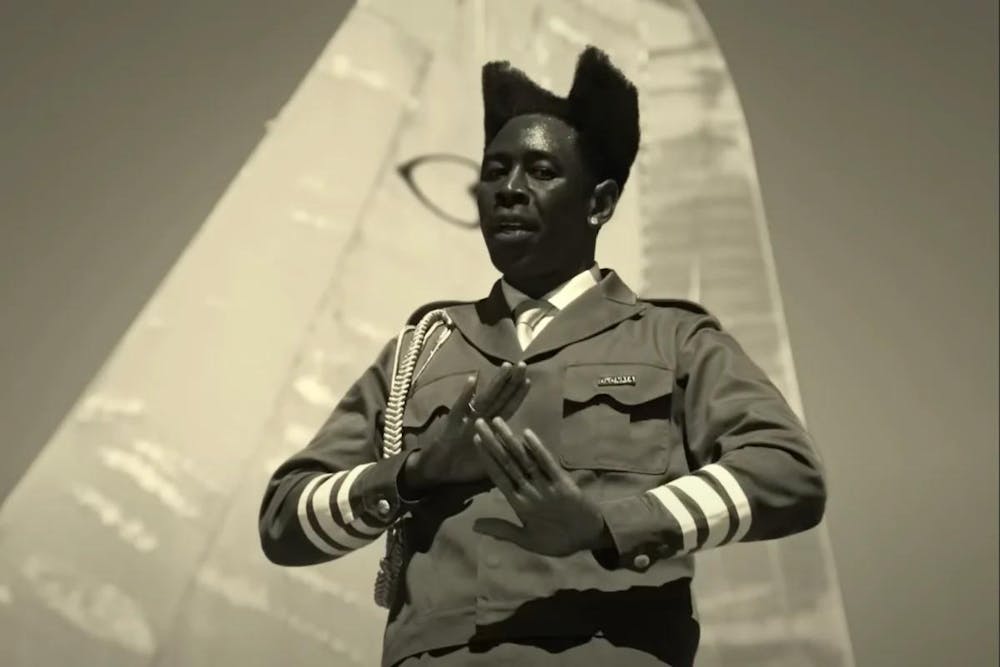Tyler, The Creator has long been known for his creative use of alter egos throughout his discography. In addition to carefully crafting aesthetics for each altar ego during his album rollouts, Tyler also alternates his tone of voice between characters during his songs to express his own thoughts and emotions from a nuanced perspective.
From Ace and Sam on his early releases, “Bastard” and “Goblin,” to Wolf Haley on “Wolf” and later Sir Baudelaire on “CALL ME IF YOU GET LOST,” these characters have commonly been louder and more confident iterations of Tyler himself.
Most recently, though, Tyler’s newest album “CHROMAKOPIA” brings a more vulnerable and insecure character to the spotlight. As Saint Chroma, Tyler sports a military-style uniform and a mask that resembles, but obscures, his face, speaking to the album’s central themes of performative strength, anxiety and uncertainty.
At a listening event for the album in Los Angeles’s Intuit Dome, Tyler explained that “CHROMAKOPIA” is meant to be an “homage to” and “celebration of his home” — Inglewood, California, where the concert was taking place — and the “formative years” he spent there. This reflective theme comes in direct contrast to Tyler’s last album, “CALL ME IF YOU GET LOST,” which discussed the joys of a lavish lifestyle and opening up to new places and experiences.
“CHROMAKOPIA” opens with a spoken voice recording from Tyler’s mother, Bonita Smith, who reminds him that creativity comes from within and should be embraced regardless of pushback from the outside world.
“You are the light. It’s not on you, it’s in you,” Smith says on “St. Chroma.” “Don’t you ever in your motherfucking life dim your light for nobody.”
Smith’s voice is a guiding force on “CHROMAKOPIA.” Clips of her speaking directly to Tyler are interspersed throughout many of the album’s songs, with her words of advice and encouragement in each track conveying its central themes and messages.
Both “St. Chroma” and “Rah Tah Tah” lean into the soldier aesthetic of the project, boasting the aggressive vocals and booming production that Tyler has become known for to kick off the album. This air of confidence carries through on later tracks like “Balloon” and “Sticky,” as the featured artists Doechii, GloRilla, Sexxy Red and Lil Wayne bring infectious upbeat energy.
However, on the third track, “Noid,” Tyler begins to open up about the anxiety and uncertainty underneath his seemingly strong and confident persona. The song’s music video finds Saint Chroma overcome by paranoia, constantly in fear of being watched, chased and threatened.
Many of the songs also see Tyler reflecting on his internal struggles with romantic relationships. On “Darling, I,” for instance, Tyler discusses the fleeting nature of his infatuations, struggling to reconcile his dreams of love, family and stability with the allure of independence or someone new.
Parenthood is also a major theme of the album, as Tyler grapples with his conflicting feelings about being a father. “Hey Jane” unpacks Tyler and his partner’s emotions as they are shocked by an unexpected pregnancy. Each verse is written in letter format, with Tyler opening up about his hesitations about the responsibilities of being a father and his partner sharing her fears of facing the situation alone.
Tyler dives even further into this internal conflict on “Like Him,” discussing his strained relationship with his absent father and the complicated emotions that have come with being constantly reminded of how similarly he looks and acts to someone who he sees to be a villain.
The situation is further complicated at the end of the song, when Smith confesses that she feels it was her fault that Tyler’s father was never a part of his life. “It was my fault, not yours, not his,” she says. “He’s always wanted to be a father to you … He’s a good guy, so don’t hold that against him.” This revelation is a huge turning point for Tyler who, up until this point, had been ridiculing his father for being absent for years through his music.
What’s most exciting about “CHROMAKOPIA” is watching Tyler become more and more true to himself as the album progresses. The track “Take Your Mask Off” especially plays into this narrative, using the concept of a “mask” as a metaphor for a life of inauthenticity. Just as Saint Chroma wears a mask to hide his face, Tyler explains that people — including himself — often put up a front to hide their true feelings, thoughts or identities and calls on them to take these “masks” off.
It becomes clear then that Tyler has been utilizing the character of Saint Chroma to take off his own mask and open up to his audience throughout the album. This creative display of vulnerability is the thread that ultimately brings the whole project together.

Campbell Loi, a senior staff writer and copy editor for The Herald, is a junior from Syracuse, NY studying Public Health and International and Public Affairs. Outside of academics, she loves all things music and enjoys performing, arranging, and constantly listening to songs in her free time.





